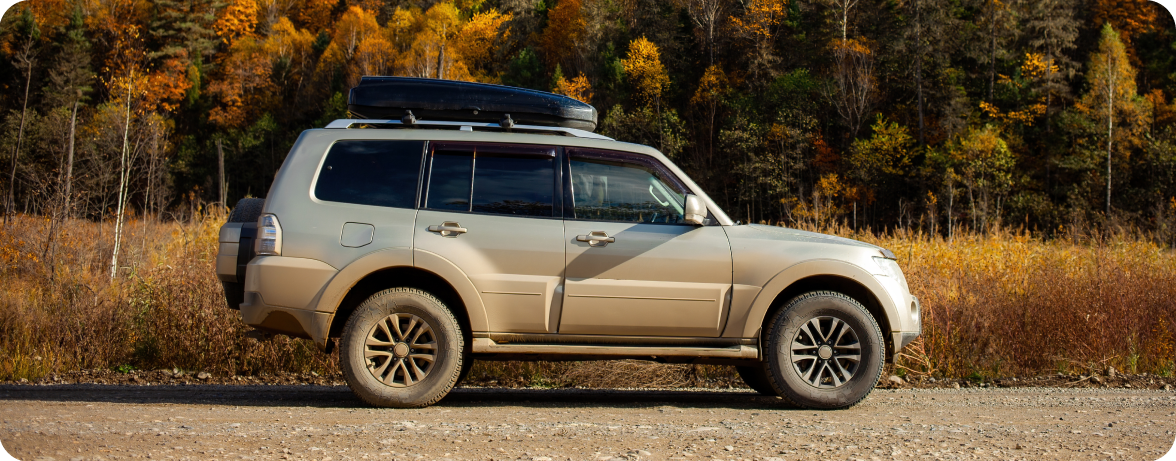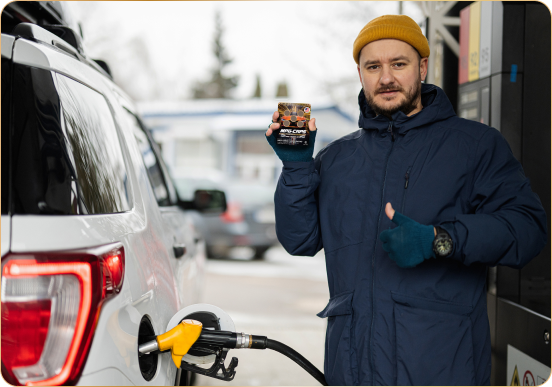
MPG-CAPS TIPS for the BEST PERFOMANCE

Fuel Economy

FAQ's

Go Further
TIPS for the BEST Fuel Economy
-
Adopt Moderate Driving Habits
Avoid jackrabbit starts, speeding, and abrupt braking, as these can reduce fuel economy by 15% to 30% according to several government estimates.
-
Maintain Proper Tire Inflation
Check your tires regularly, as they can lose up to 2 pounds per month due to seasonal temperature changes.
-
Plan Efficient Routes
Use GPS to map out the most effective multi-stop trip.
-
Avoid Heavy Traffic
Whenever possible, plan your travel to avoid the busiest traffic times.
-
Perform Routine Maintenance
Follow the maintenance schedule in your vehicle owner's manual. Regularly clean the air filter and change spark plugs during tune-ups
-
Remove Excess Weight
Clear out unnecessary items from your vehicle's interior and trunk. An extra 100 pounds can reduce MPG by up to 1%.
-
Limit Idling
Only idle your vehicle for 20 seconds at startup to ensure crankcase oil circulates through the engine.
-
Use the Correct Fuel
Use the pump octane required for your vehicle. Modern engine computers typically eliminate the need for high-octane fuel. If you still prefer higher octane, try MPG-CAPS and then switch to the next lower octane to maintain performance and save on fuel.
-
Find the Best Gas Prices
Use smartphone apps to locate the best gas prices. In the US, gasoline quality is highly regulated, so cheaper options are generally of similar quality to more expensive ones.
-
Minimize Air Conditioner Use
Use interior fresh air vents to cool the car when outside temperatures permit. Avoid driving with windows open as it increases aerodynamic drag and reduces fuel efficiency.
-

Taxicabs
-

Passenger Cars
-

Recreational Vehicles
-

Watercraft
FREQUENTLY ASKED QUESTIONS

-
How do MPG-CAPS differ from typical bottled products designed to do the same thing?
The active ingredients may be the same or similar in both MPG-CAPS and bottle products. However, MPG-CAPS are composed of 100% active ingredients and do not require a carrier fluid. A random analysis of major brands showed an active ingredient content of well under 10% of the liquid content. The remainder of the contents include a carrier fluid such as paint thinner or diesel fuel. * -
What are MPG-CAPS and what benefits do they offer?
MPG-CAPS are a multifunctional fuel additive in a fast-dissolving caplet form. When added to gasoline or diesel, they dissolve completely and mix thoroughly to help:- Increase octane and power*
- Reduce smoke and harmful emissions*
- Improve fuel economy*
- Keep the combustion chamber clean*
- Keep injectors clean*
-
How quickly does a standard MPG-CAPS caplet dissolve?
Depending on the aromatic quality of the fuel and movement of the fuel within the fuel tank, MPG-CAPS will dissolve in approximately 25 to 40 minutes. The caplet begins to work immediately as it dissolves and disperses throughout the fuel. The characteristics of diesel fuel are different. The dissolve time is longer, and relies on the movement of the diesel fuel and on heat generated in a typical diesel fuel delivery system.

-
Is MPG-CAPS safe for all gasoline and diesel engines?
Yes, MPG-CAPS are safe and effective for all gasoline, 'flex fuels,' ethanol-blended gasolines, diesel, and biodiesel. MPG-CAPS chemistry promotes improved combustion of hydrocarbon fuels, helping to improve engine efficiency and reduced emissions.* -
How can the same caplet be used in both gasoline and diesel engines?
The combustion process for hydrocarbon fuels is similar across internal combustion engines. MPG-CAPS chemistry enhances fuel combustion regardless of engine type, leading to more complete combustion, which can result in more power, less smoke and emissions, and improved fuel economy.* -
How often should I use MPG-CAPS?
For maximum benefit, add one MPG-CAP at every fill-up. Since MPG-CAPS may improve the fuel, the benefits diminish as the treated fuel is consumed.* -
How many caplets should I use per fill-up?
Each MPG-CAPS caplet treats between 11-20 gallons. Do Not Over treat. Adding more than the recommended dose will not result in proportional improvement. -
What kind of fuel economy improvement might I expect?
Using MPG-CAPS can enhance combustion, potentially leading to more power and better fuel economy. Drivers maintaining their usual driving habits might see an improvement in fuel economy. However, users driving more aggressively to enjoy the increased power and performance may experience minimal or even reduced fuel economy. *

